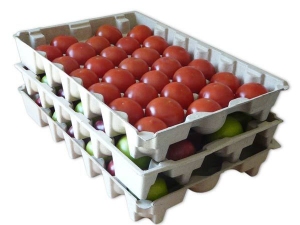
Molded Pulp's Sustainability Benefits to Drive Robust Growth in Packaging Markets Through 2024 Trays and filler flats used for eggs, apples, and other types of fruits and vegetables will remain the leading packaging outlets for molded pulp through 2024, accounting for over 20% of sales.
Trays and filler flats used for eggs, apples, and other types of fruits and vegetables will remain the leading packaging outlets for molded pulp through 2024, accounting for over 20% of sales.
Nov. 4, 2020 - US demand for molded pulp (or molded fiber) packaging is forecast to increase 6.1% annually to $1.3 billion in 2024, according to a new Freedonia Group analysis. Demand is expected to climb at a robust pace due to molded pulp's environmental advantages, specifically its recyclability, biodegradability, and ability to be composted in industrial facilities. Other key factors supporting strong sales growth include:
Food Trays/Filler Flats & Cartons Will Remain the Top Two Molded Pulp Packaging TypesTrays and filler flats used for eggs, apples, and other types of fruits and vegetables will remain the leading packaging outlets for molded pulp through 2024, accounting for over 20% of sales. Trays and flats — along with egg cartons — were among the earliest end uses for molded pulp, due to the material's good cushioning properties and low cost. Egg cartons will continue to account for the second largest portion of molded pulp sales, as egg producers continue to rely on molded fiber for its protective properties and comparable price to EPS foam:
The Freedonia Group, a division of MarketResearch.com, is a leading international industrial research company providing critical business information to decision makers and research analysts. For further information, visit: www.freedoniagroup.com SOURCE: Freedonia Group |